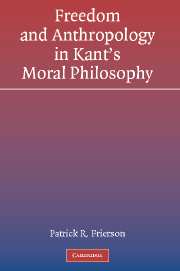Book contents
- Frontmatter
- Dedication
- Contents
- Preface
- Introduction: A Problem with Kant’s Moral Anthropology
- I The Problem
- 1 The Asymmetry in Kant’s Conception of Freedom
- 2 Anthropology as an Empirical Science
- 3 The Moral Importance of Kant’s “Pragmatic” Anthropology
- 4 Moral Anthropology in Contemporary Neokantian Ethics
- II The Solution
- 5 Transcendental Idealism, Radical Evil, and Moral Anthropology
- 6 Moral Influence on Others
- Epilogue: Incorporating Moral Anthropology and Defending Kantian Moral Philosophy
- Notes
- References
- Index of Kant’s Works
- Name Index
- Subject Index
5 - Transcendental Idealism, Radical Evil, and Moral Anthropology
Published online by Cambridge University Press: 28 July 2009
- Frontmatter
- Dedication
- Contents
- Preface
- Introduction: A Problem with Kant’s Moral Anthropology
- I The Problem
- 1 The Asymmetry in Kant’s Conception of Freedom
- 2 Anthropology as an Empirical Science
- 3 The Moral Importance of Kant’s “Pragmatic” Anthropology
- 4 Moral Anthropology in Contemporary Neokantian Ethics
- II The Solution
- 5 Transcendental Idealism, Radical Evil, and Moral Anthropology
- 6 Moral Influence on Others
- Epilogue: Incorporating Moral Anthropology and Defending Kantian Moral Philosophy
- Notes
- References
- Index of Kant’s Works
- Name Index
- Subject Index
Summary
Over the past several chapters, I have shown that there seems to be a deep problem in Kant's moral philosophy, one that Schleiermacher recognized and to which he drew attention.This problem is not limited to Kant but is shared by any moral theory that takes seriously a strong, nondeterminist conception of human freedom as a condition of moral responsibility while at the same time recognizing the obvious importance of helps and hindrances to moral development.Essentially, Schleiermacher points out an apparent conflict between three fundamental assertions: that the will is transcendentally free, that anthropology is empirical, and that anthropology studies morally significant helps and hindrances.Because Kant so forcefully articulates the nature of freedom, the problem arises for him in a particularly stark way.The fact that Kant's recognition of helps and hindrances has been ignored for so long only heightens the sense today that this recognition is incompatible with the rest of his theory.Moreover, as we saw in the previous chapter, recent attempts to make sense of these helps and hindrances either deny their full moral significance or sacrifice Kant's strong conception of freedom.
In this chapter, I offer a Kantian solution to Schleiermacher's dilemma. In section 1, I show that Kant has the resources to distinguish between the empirical will, which can be affected by empirical influences, and the free will, which cannot. In section 2, I explain that changes in the empirical will are morally relevant as expressions of the moral status of the free will. In section 3, I argue that the Kantian notion of “radical evil” requires rethinking the nature of the good human will, and grace makes such a rethinking possible.In section 4, I show that proper expressions of a good human will involve attention to considerations of moral anthropology. Thus moral anthropology is morally relevant because it describes aspects of human life that are important expressions of a good human will.
Kant’s Crucial Distinction
Unfortunately, Kant does not offer an extended, systematic treatment of the relationship between freedom and moral anthropology.However, his mature moral theory does provide the resources for solving the problem raised by Schleiermacher, and Kant provides scattered but important remarks that directly address it.
- Type
- Chapter
- Information
- Freedom and Anthropology in Kant's Moral Philosophy , pp. 95 - 135Publisher: Cambridge University PressPrint publication year: 2003



